Senior Iranian Clerics Praise Hamas For Action Against Israel
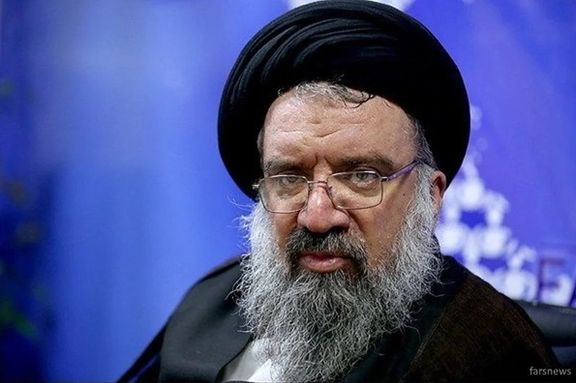
Senior cleric Ahmad Khatami has justified attacks by the militant group against Israel as a legitimate form of defense, speaking in a Friday prayer sermon in Tehran.

Senior cleric Ahmad Khatami has justified attacks by the militant group against Israel as a legitimate form of defense, speaking in a Friday prayer sermon in Tehran.
Khatami claimed such action aligns with the teachings of the Quran, saying: "May God bless your hands! Strike Israel because your striking is worship."
The sermon comes as tensions in the Middle East escalate amid the ongoing Hamas-Israel conflict, which began two months ago.
Iranian authorities have been issuing a series of inflammatory statements in recent weeks, warning both Israel and its ally, the United States, of the response should attacks on Gaza persist.
The Friday prayer leader in Mashhad, Ahmad Alamolhoda, echoed the words of his counterpart in Tehran, saying: "Fortunately, today the resistance movement has encompassed the majority of the region, and we witnessed the resistance's attacks on Israel during the Gaza war."
Commenting on the global impact of the “Al-Aqsa storm”, as the October 7 massacre by Hamas of around 1,200 Israelis has been dubbed, Alamoldha said: "Today, the whole world realized that America is a child killer and a devil regime."
Alamolhoda holds a significant position as the Supreme Leader Ali Khamenei's representative in Mashhad, a city of high Shiite importance. He is also the father-in-law of President Ebrahim Raisi, who assumed office in 2021 after being handpicked by Khamenei in a tightly controlled electoral process.

As two major corruption cases became the main headlines in Iran this week, the minister of economy blamed economic stagnation on “Trump’s sanctions.”
Ehsan Khandouzi, speaking to university students, reluctantly admitted that successive administrations have mishandled the economy, but insisted that US sanctions imposed in 2018, wiped out economic growth and “led to today’s high inflation.”
“The sanctions during the Trump era caused the country's economy to decline, and inflation is now the legacy of the sanctions in recent years. These sanctions have affected the purchasing power of households,” Khandouzi insisted.
No one truly knows the real annual inflation rate, since the government stopped issuing periodic reports in 2019, but occasional figures announced by officials show that inflation is above 50 percent, and food prices have increased much faster.
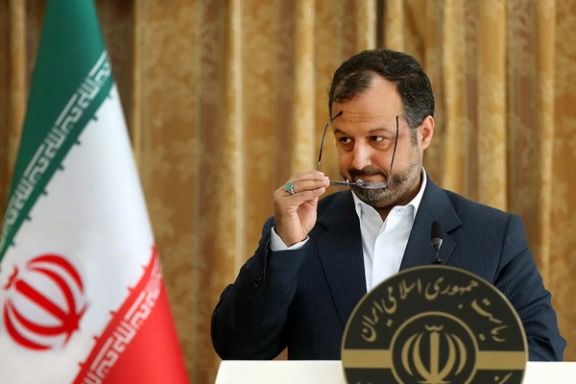
Khandouzi referred to 2011, when he said the national income had reached an all-time high, but he did not mention that skyrocketing oil prices were the reason why the country had disposable income more than a decade ago. In contrast, currently there is not enough foreign currency to import raw materials for producing medications and people must go from pharmacy to pharmacy to find a can of baby formula.
One student asked the minister if “you want to drag everyone into poverty,” to which the minister gave a condescending answer. “When I was a student like you 25 years ago, I was also a critic, but one expects students to ask more sophisticated and analytical questions,” Khandouzi replied. He then went on to tell the students that the ministry of economy has set up a summer school and they are welcome to attend the courses and learn economics.
Meanwhile, the minister admitted that the Islamic Republic in the past 20 years has completely mishandled its banking sector and now several institutions are on the verge of bankruptcy. He also acknowledged that the government is afraid of protests if banks go under, and depositors demand their money. For this reason, the government prefers to dissolve these institutions into the Central Bank of Iran, a strange arrangement for any country.
However, Khandouzi did not mention that there no true private sector banks in Iran. The so-called non-governmental banks are in fact institutions set up by public entities or by regime insiders who have political influence and therefore have immunity from supervision.
Insider dealings became once again public scandals this week. A company dealing with tea imports misused up to $3.5 billion it received from the government at preferential rate of exchange. Instead of importing tea and machinery as expected, the company sold dollars on the open market at much higher rates. Despite pledges by top officials to investigate and address the fraud, so far, no prominent person has been detained. Some local media outlets say that without the complicity of top officials such a fraud would not have been possible.
At the same time, members of Tehran’s municipal council are asking about more than $300 in city revenues that has “disappeared”, meaning there is no trace of the money in budget allocations. This is a substantial sum of money in Iran, equaling 170 trillion rials.
The minister of economy did not address the corruption scandals during his meeting with the students. He tried to argue that the economy has improved in the past two years during the reign of hardliners. President Ebrahim Raisi also presented rosy figures to parliament earlier this week. One lawmaker commented after the meeting that “The president seemed to be talking about a different country.”
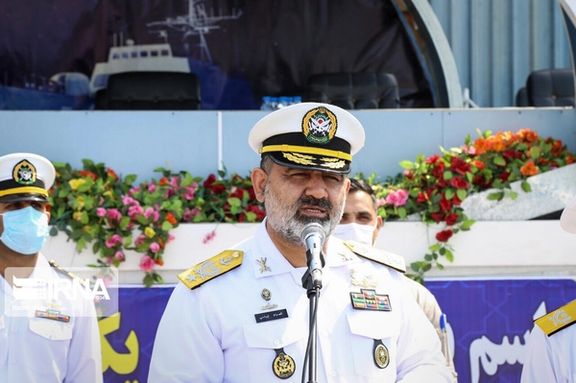
The commander of Iran’s navy has claimed it is maintaining “maritime security” in the region amid allegations of the Islamic Republic’s involvement in Houthi attacks on shipping.
Admiral Shahram Irani was speaking on Friday as he announced plans for a regional naval coalition and upcoming large-scale naval exercises involving other countries along southern coasts, with additional exercises slated for the Caspian Sea region.
He said his Navy has a strategic plan to be present in the oceans, adding that “maritime security in the region is firmly established under the Islamic Republic system.”
It comes after a number of recent incidents in which shipping in the Red Sea has been targeted by Houthis.
Since the deadly clash between Hamas and Israel on October 7, the Yemen-based rebels have launched multiple drone and missile attacks on US and Israeli targets in the region. Despite accusations against Iran, the Biden administration, having removed the Houthis from the US terrorist list, has not responded to the maritime attacks.
The Houthi attacks followed Iranian leader Ali Khamenei's call to stop oil and food shipments to Israel. Controlling most of Yemen's Red Sea coast, the group had previously targeted Israel with ballistic missiles and armed drones.
While Iran has avoided direct involvement in the Israel-Hamas conflict, it allegedly employs proxy groups like the Houthis and Hezbollah to target Israel and US interests in the region. In response to Iran's actions in the critical maritime route of the Strait of Hormuz, the Pentagon deployed a portion of the Bataan Amphibious Readiness Group accompanied by a Marine expeditionary unit.
Over the past two years, Iran has been implicated in attacks, seizures, or attempted seizures of nearly 20 internationally flagged merchant vessels in the vital global shipping passage of the Strait of Hormuz, according to reports from US Central Command, responsible for overseeing operations in the Middle East region.
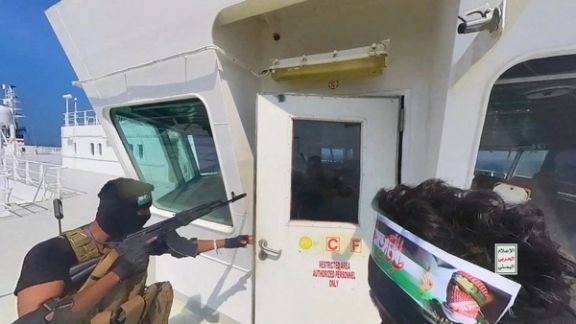
British officials have warned shipping in the Red Sea to “exercise caution” after a vessel was ordered to change course by "an entity" claiming to be the Yemeni authorities.
The incident comes after a series of attacks in Middle Eastern waters since the eruption of hostilities between Israel and Iran-backed Palestinian militant group Hamas on October 7.
On Friday, the UK Maritime Trade Operations (UKMTO) agency said it had “received reports of an entity declaring itself to be the Yemeni authorities, ordering a vessel to alter course in the Southern Red Sea.”
Agency officials added: “Vessels in the vicinity are advised to exercise caution and report any suspicious activity to UKMTO.”
On Sunday, the US military reported three commercial vessels coming under attack in the Southern Red Sea.
Yemen's Iran-backed Houthi group claimed responsibility for drone and missile attacks on two Israeli vessels in the area on Sunday. According to the Houthi group, the attacks were carried out in response to the demands of Yemenis and calls from Muslim countries to stand in solidarity with the Palestinian people.
On Wednesday, the UKMTO was informed of an incident related to a suspected drone over the Red Sea, situated to the west of the Yemeni port of Hodeidah.
Last month, the Houthi group – which controls most of Yemen's Red Sea coast -- also seized a British-owned and Japanese-operated cargo ship.
Their attempt to hijack another vessel was thwarted thanks to the US Navy as it responded to a distress call from an Israeli-managed commercial tanker in the Gulf of Aden after it had been seized by gunmen.
The Houthi attack came after calls by Iran’s leader Ali Khamenei to stop the shipment of oil and food to Israel. The group, which controls most of Yemen's Red Sea coast, had previously fired ballistic missiles and armed drones at Israel and vowed to target more Israeli vessels.
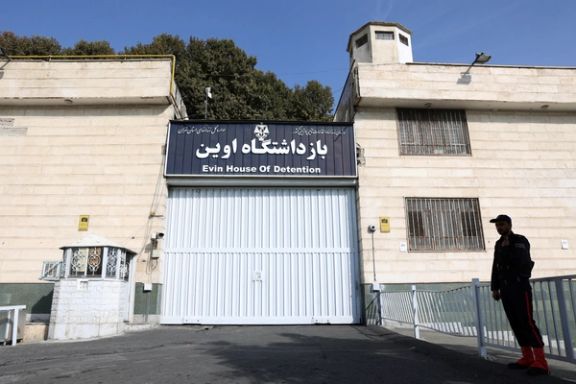
The Campaign to Free Political Prisoners in Iran (CFPPI) says use of pharmacological torture against political prisoners has increased alarmingly in the past year.
The Canada-based non-profit has urged the international community to investigate this type of torture and deaths resulting from it in Iran. “The Islamic regime in Iran must be held accountable for its crimes against political prisoners,” a recent report by CFPPI, said.
Pharmacological torture is the use of psychoactive, psychotropic drugs or other types of drugs to punish, extract information, or to subdue prisoners into compliance by causing distress in the form of pain, anxiety, panic, psychological disturbances, immobilization, hallucination, paranoia, disorientation, and addiction without leaving obvious physical signs of violence.
CFPPI has said in its report that it conducted extensive investigations that indicated an alarming increase in the use of pharmacological torture in Iran in the past five year and particularly since Women, Life, Freedom protests that began in late September 2022. Their findings draw on testimonies of those arrested during the protests of 2022-2023 as well as on the accounts of former political prisoners.
According to CFPPI's report, the regime has intentionally and systematically subjected more political prisoners to pharmacological torture by sending detainees to mental hospitals and forcibly administering anti-psychotic drugs at multiple prisons across the country, as well as by mixing drugs into their food and drinks.

“Whereas formerly, prison guards would offer sedatives to prisoners, which many of the younger and newer prisoners voluntarily accepted to ease their experience, new reports suggest that since September 2022 the practice has changed to violent and coercive administering of unwanted drugs,” the report said.
One of the victims interviewed for the report, a 27-year-old woman who said she had been raped several times during her detention, told CFPPI that she was forced into taking unidentified pills which had a profound impact on her, leading to psychotic episodes. After her release from prison, she attempted to take her own life and lost one of her kidneys.
Prisoners say they have also noted serious pains and aches in the absence of the drugs.
Dissident rapper Saman Seydi (Yasin) is among political prisoners who have spoken up about their tortures including administration of unidentified pills and injections at a very high cost. He has been sentenced to death and is still in prison.
Yasin was held at a mental hospital on the orders of the notorious judge Abolghasem Salavati for four days as punishment for smuggling out an audio file from Tehran’s Evin Prison in which he described tortures including being subjected to mock execution.
At the mental hospital where he was tied to the bed, security forces beat him for refusing to allow them to inject him with an unknown substance. Yasin claims he fell unconscious for 24 hours after the injection and has been having problems with his eyesight and balance since then.
Yasin’s torturers, he says, wanted to force him to “confess” to possession and use of a firearm during last year’s protests.
In several other cases in the past year, detainees including young protesters have died soon after their release from prison under suspicious circumstances.
Pressure on victims’ families to accept “suicide”, “sudden death”, or “overdose” as cause of death of individuals with no prior record of major health problems, depression or addiction has raised suspicions that the deaths may have resulted from pharmacological torture.
“Pharmacological torture is extremely distressing and punitive as it causes severe physical pain, harmful and painful physiological changes, confusion, perceptual abnormalities, fearfulness and anxiety, lethargy, and loss of personal agency,” William Hopkins, Consultant Psychiatrist at Freedom from Torture who has worked to rehabilitate survivors of pharmacological torture from various countries is quoted by the report as saying.
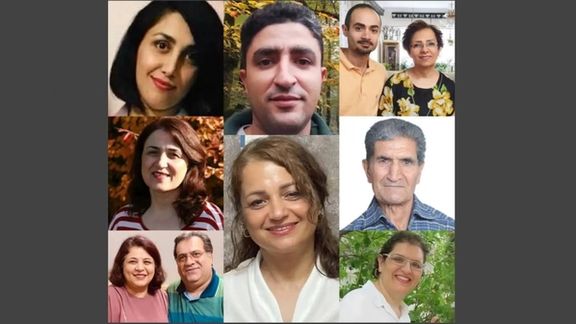
Followers of the Baha’i faith continue to be systematically persecuted by the Iranian authorities, in cases uncovered by Iran International.
One adherent of the religion, Nahaleh Shahidi, is still in jail after being apprehended in April by security forces at the Kerman railway station and subsequently transferred to Kerman prison.
He is reportedly facing charges of "propaganda against the system" and "formation of groups with the intention of disrupting national security."
He was informed of the accusations months ago, but no formal indictment has been issued. A source close to Shahidi’s family says the prosecutor's representative has allegedly halted the progression of the case on a number of pretexts.
The source said that Shahidi's detention is routinely extended each month, without any indication of a trial or release with bail in sight.
On Thursday, legal proceedings were initiated against five Baha'i residents from Ghaemshahr in northern Iran. The defendants learned about the prosecution through text messages on their phones.
A source close to the families of the residents expressed concern, saying, "It seems that security forces are attempting to fabricate cases against the individuals, as there is still no news about the charges and reasons for filing a case against them."
Informal sources estimate that over 300,000 Baha'i citizens reside in Iran. However, the Constitution of the Islamic Republic officially recognizes only Islam, Christianity, Judaism, and Zoroastrianism. Baha'is constitute the largest non-Muslim religious minority in Iran and have been systematically targeted for persecution since the 1979 revolution, facing arbitrary detentions, discrimination, and restrictions on religious practices.